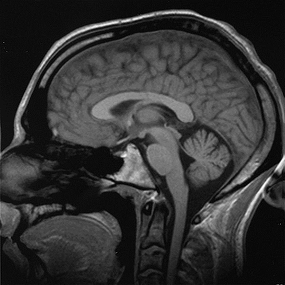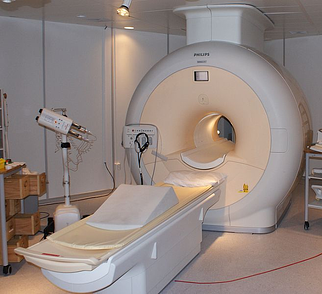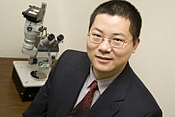
(Courtesy of Wikimedia Commons and Christian R. Linder)
Can’t remember where you parked the car? With the help of a new grant at UNR we may all be sleeping and remembering more soon. The University of Nevada, Reno is about to improve with a new $10M Center of Biomedical Research Excellence (COBRE) grant from the National Institute of General Medical Sciences. The grant is designed to help the university improve its faculty and expertise in Integrative Neuroscience. This grant joins two other COBRE grants currently awarded to UNR, the maximum number of grants that any one university can have. In order to receive this award a university must already have made strides toward becoming a leading university in a particular field. For UNR, this field is Integrative Neuroscience. The grant is designed to provide the university with addition funds to hire new faculty researchers, furthering their ability to become a leading research university in a particular field.
"We fully appreciate the importance of developing our capabilities in the field of neuroscience," said University President Marc Johnson. "The investments we make in this program will increase the quality and impact of our institution, opening up new opportunities not only for our students and researchers, but also for northern Nevada. These investments bring resources, technology and economic development opportunities to our community."

(Courtesy of Wikimedia Commons and Jan Ainali)
This COBRE grant is only part of the university's plan to expand its neuroscience program. The university plans to hire more professors with research expertise in cognitive neuroscience and MRI technology. UNR intends to spend nearly half a million dollars purchasing two new neuro-imaging systems, as well as creating an on campus MRI facility staffed by a new faculty member.
At UNR there are currently 5 assistant professors who will benefit from this new funding. The professors are Assistant Professor of Psychology Marian Berryhill, Assistant Professor of Psychology Gideon Caplovitz, Assistant Professor of Biology Alexander van der Linden, Assistant Professor of Biology Alex Keene, and Assistant Professor of Electrical and Biomedical Engineering Xiaoshan Zhu.
 |
Professor Marion Berryhill’s laboratory is exploring how brain lesions affect cognition and memory, techniques to improve human memories, and the nature of internal attention. In her research she uses neuropsychological (patient-based), neuroimaging (MRI) and neurostimulation to understand the inner working of the brain. Her laboratory is currently using electrical stimulation to the brain as a technique to improve mental ability during memory tests. All of these projects are aimed at helping us to understand the nature of memory as well as how to maintain our memory as we age. |
|
Courtesy of Department of Psychology |
|
 |
Gideon Caplovitz is interested in understanding how the brain perceives the environment we live in. His laboratory uses a variety to tools such as: psychophysical, eye-tracking, and neuroimaging (fMRI, EEG) to measure the changes in the brain with visual perception. In his work, he tricks the brain into seeing images that do not exist. This technique is only possible in people with no brain damage. In the future, his tests could be uses as a early detection system for brain damage or disfunction. |
| Courtesy of Caplovitz lab | |
 |
Alexander van der Linden's laboratory is studying how environmental changes affect circadian rhythms using the nematode (Caenorhabditis elegans) as a simple animal model. Circadian rhythms are 24-hour cycles that govern how our body functions, and reacts to outside forces like temperature and sunlight. Already the laboratory has identified genes that are a part of the circadian system in nematodes. He hopes to use this research to help stroke patients in the future. According to Professor Linden,“When stroke patients have a brain injury, often their circadian rhythms are disrupted, telling them when to eat and sleep.” |
| Courtesy of Alexander van der Lindenlab | |
 |
Professor Alex Keene is studying how our memories are affected by sleep deprivation. In his lab he is using Drosophila fruit fly, an inexpensive, animal model with fast life cycle to find genes that control sleep and memory. With any luck, Professor Keene will help us to sleep better and remember more. |
| Courtesy of Department of Biology | |
 |
The laboratory of professor Xiaoshan Zhu is developing new nanoparticles that are able to detect extremely low levels of biomarkers, such conditions as: cancer, infectious diseases, and neural diseases. These nanoparticle have a very small volume in comparison to their surface area, and are engineered with unique properties. These properties allow them to target specific humans locations in the human body from proteins to tissue. The presence of these particles lets MRI create clearer picture with more contrast. With the help of these engineered nanoparticles, we will be able to see brain damage and help fix it. |
| Courtesy of Integrated Bio-Analytical Systems Lab |
With the help of these researchers and their Integrative Neuroscience projects at UNR, we may be able to detect early brain damage, pinpoint the location accurately, restore Circadian Rhythms to stroke vicitms, and keep our memory as we age. So, perhaps in the future with the help of these University of Nevada, Reno scientists, we will more reliably be able to remember where we parked the car.
To read more of our recent research and grants articles on UNR, here is a link to visit our science market blog:
If your are a life science researcher or laboratory supplier, Biotechnology Calendar, Inc. will be holding its annual Reno BioResearch Product Faire Front Line event on June 3, 2013. Biotechnology Calendar hosts trade shows at top research institutions across the nation, and attracts purchasing agents, professors, and lab managers from research institutions and universities. See our full 2013 Nationwide Show Schedule for all other locations.
If you are interesting in finding out more information on funding stats and vendor info for the University of Nevada, Reno, feel free to click the button below:
If you are unable to attend our Biotechnology Calendar, Inc. event in Reno, here are some other nearby events.
- 02/06/2013- 8th Annual Mission Bay Biotechnology Vendor Showcase™ located in San Francisco and situated on the UC San Francisco Campus
- 02/07/2013-11th Semiannual Sacramento BioResearch Product Faire™ at the University of California Davis Medical Center
- 06/05/2013- 16th Annual- Berkeley BioResearch Product Faire™ at the U.C Berkeley campus.


